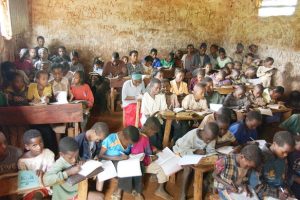
“Doubting” as a method to search for truth and understand the world we live in and the nature of human being grew simultaneously both in Africa and Europe in the 17th C. Ethiopian philosopher Zarayakob (1599-1692) and his contemporary French rationalist Rene Descartes (1596-1650) employed the method to arrive at “certain knowledge of self-existence.” But both did not know one another though they share the same period.
Descartes famous quote “Cogito, ergo sum” (“I think, therefore I am”) may tell us more to understand the method. “He found knowledge from tradition to be dubitable because authorities disagree; empirical knowledge dubitable because of illusions, hallucinations, and dreams; and mathematical knowledge dubitable because people make errors in calculating. He proposed an all-powerful, deceiving demon as a way of invoking universal doubt,” see in “Methodic doubt” Encyclopedia Britannica. Zarayakob also doubted the scriptures he had learned, the “truth” he had been told. As a teacher, he refrained from being judgmental and avoided to confirm the interpretations on scriptures either true or false.
He made his students to investigate the reality using their pure intellect. But to me, the thoughts and “truth” and methods of Zerayakob discussed was a little closer to dancing with death. The community he lived with could have regarded him as nonconformist. And this could have brought huge condemnation to him. Born in the ancient town of Aksum, Zerayakob was first admitted to Vocal School. His coarse sound, however, hindered him from pursuing his education. Even his classmates ridiculed his sound.
“I then went to a school of parchment and studied the interpretation of books for ten years. I learned how foreigners interpret them and how our scholars interpret them. To my dismay, both ways of interpretations were not in accord with my thoughts,” he wrote in his Book, Hatata ZeraYakob. Completing his education, he started to teach interpretations of sacred books of Christianity back in Aksum. “Most of my friends brewed enmity against me.
I was far better than them in loving my friends and in education. I taught for four years in Aksum. And my methods were that I present how others interpret books and I used to tell students what interpretation could be drawn when we investigate further. I never say this one is good and that one is bad.” “My enemies conspired against me. They charged me as if I teach to incite violence and rally the public against Emperor Susenyos.
This was a dangerous allegation and I exiled to Shewa and found a cave to pursue a solitary life for two years,” he recounted. Claude Sumner, an Indian professor who was teaching at Addis Ababa University, throw lights on the works of Zarayakob, wrote Tassew Asfaw in a 2004 paper titled: The Contribution of Native Ethiopian Philosophers, Zara Yacob and Wolde Hiwot, to Ethiopian Philosophy. The search for the reality/reason His inquiry to the existence of God was provoked by the cruelty of man.
His time was tough as Susenyos I was converted to Catholic; residents were forced to follow the Kings religion. Due to this, fierce clashes surfaced between the converts and Orthodox Christianity followers which claimed many lives. Metaphysics-about reality beyond the physical world, How does God knows? Is there anyone in heaven who knows? Why does He remain silent on men’s depravity while they corrupt His name act with the inquiry with his holy name? Tasew quoted Sumner 1985 p 232.
“Moreover, he was praying that his God would make him intelligent and reasonable in order to be able to know the hidden wisdom of God.” In his search for the creator he investigated whether or not God exists who listens to his prayers, he referred to David’s Psalms ‘Is the inventor of the ear unable to hear?” His critical inquiries continued. ‘Who is it that provided me with an ear to hear, who created me as a rational [being] and how have I come into this world? Where do I come from?” He also questioned as to who created himself, his parents? Is so, who created his parents and the parents of his parents and he had to go to past generations to get the first creator, a creator that is not created. He prayed so that God would help him arrive at the truth.
“The lord and master of all things, without beginning or end, immutable, whose years cannot be numbered,’ And I said: ‘Therefore, there is a creator; else there would have been no creation. This creator who endowed us with the gifts of intelligence and reason, cannot he himself be without them? For he created us as intelligent beings from the abundance of this intelligence and the same one being comprehended all, creates all, is almighty.’ And I used to say: ‘my creator will hear me if I pray to him,’ and because of this thought I felt very happy. (Sumner, 1985, P.233). Zarayakob, an Ethiopian philosopher in the 17thC, meditated in a cave for two years that he got answers to his critical inquiries.
The human being is the master of his life, God has given him free will, but man preferred to be vice, and he decided that the flaw is not with God but Man’s failure to choose between virtues and vice, Zarayakob may have concluded. If we are existing, we are creations. But God is the creator. He is the knower who created us, knower. He created everything, he is all-powerful, and he embraces all, as the philosopher wrote. About Religions Truth is one. But if you ask seniors in the different sects, they tell us that each of their religion is correct. And each of them is the bearer of truth. They never look into the teachings rationally.
They only take what their predecessors told them. And he questions that the followers failed to use their pure intellect or intelligence that God instilled in their hearts. They take what they were told for granted. If he were existing today, he would ridicule the tens of thousands of religions. But his teaching, I feel, is still important to better religious mutual coexistence.
He put some of the teachings of ancient prophets to the test of logic and found out that some of them to be inconsistent to God’s will, at times he knocked the teachings for being utterly against God’s works. Sexuality Sexuality is the sacred creation of God to ensure the continuity of the works of his hands, argues Zerayakob. So, the teachings that promote solitary life, according to him, go against the nature of human being. Our intuition tells us the teaching on solitary life seems less true.
Menstrual cycle The teachings of this Ethiopian philosopher could also reconcile most women of the less modern society with their own nature. God with his pleasant wisdom makes the blood to ooze from women’s wombs. But some religious teachings consider women unclean during the menstrual period. This impurity is also taken as it affects people who touch her.
This teaching has brought a burden on women and their life. And this stands in contradiction to the sacred creation of God, he argued. To conclude, quite often, the media and academic alike quote western philosophers. The trend may appear to ignore Africans as they did not exist at all as if they did not think and philosophize. And this might be the impact of Eurocentric perspective and episteme. But Africans, like any society, searched for truth and guided their lives with knowledge.
Prof. Bekele Gutema’s 2015 work ‘The Intercultural dimension of African philosophy’ African Study Monographs 36 (3): 139–154 could better capture my argument: “Historians of African philosophy claim that the history of African philosophy is constituted by, among other discourses, ancient Egyptian philosophy, the philosophies of the centers of Islamic learning in West Africa (e.g., Timbuktu, Songhai, etc.) and philosophers such as Anton Wilhelm Amo and Zara Yacob, who emerged at the beginning of the modern era.” Researchers suggested the relevance of Zarayakob’s teachings, among others, to settle current controversies in religious affairs. “ [His teachings could] instill a culture of mutual religious coexistence and religious pluralism, Fasil Merawi, in ZeraYacob’s Hatata and the vitality of indigenous Ethiopian philosophy, EJSS Vol. 3, No. 2, 2017.
The Ethiopian Herald May 17/2019
BY WORKU BELACHEW





